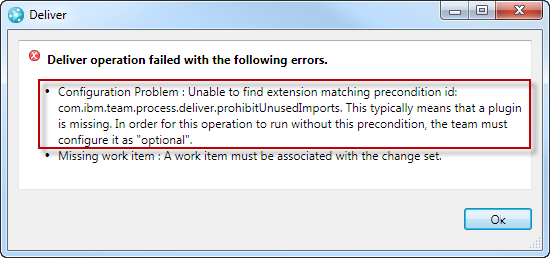How does "Fail if not installed" affect users of other clients?
Accepted answer
Comments
So there is no way to require the advisor for any user who is using the Eclipse client, but not require it for any user who is using some other client where it would not even be possible to install the advisor?
Hi Lauren,
first, there is server and client operational behavior. I think the OOTB server operational behavior should be always available. I am not sure what happens if you forget to deploy a custom operational (e.g. in an upgrade) behavior and have it configured as required. I would expect you could not deliver without either providing it or making it optional.
If you configure client operational behavior as "fail if not installed", and you want to check in with a client that does not have the behavior configured, it fails. See the screenshot of a RTC Shell that tries to deliver and where the unused imports client precondition is mandatory.

So I don't see how you can do what you described in your comment.
Let's say we have both the "Fail if not installed" and "User may overrule" boxes checked. A user of the Windows shell integration tries to deliver a file. It would fail by default because the plugin is not installed. Can users of the shell integration overrule preconditions? Can users of the VS client overrule preconditions?
In my test it fails if the precondition set to fail if not installed is not installed. I could not override it and in the windows shell I see no option to override it.
In order for this to work you have to make it optional.
Thanks for all of the info! I have no experience with those clients, so I appreciate you trying it out!
Thanks, Ralph, for the great answers. One thing I want to clarify for future reference is that the behavior is really dependent on the client's capabilities. In the Eclipse client, for example, you can overrule a precondition that fails because it's not installed.